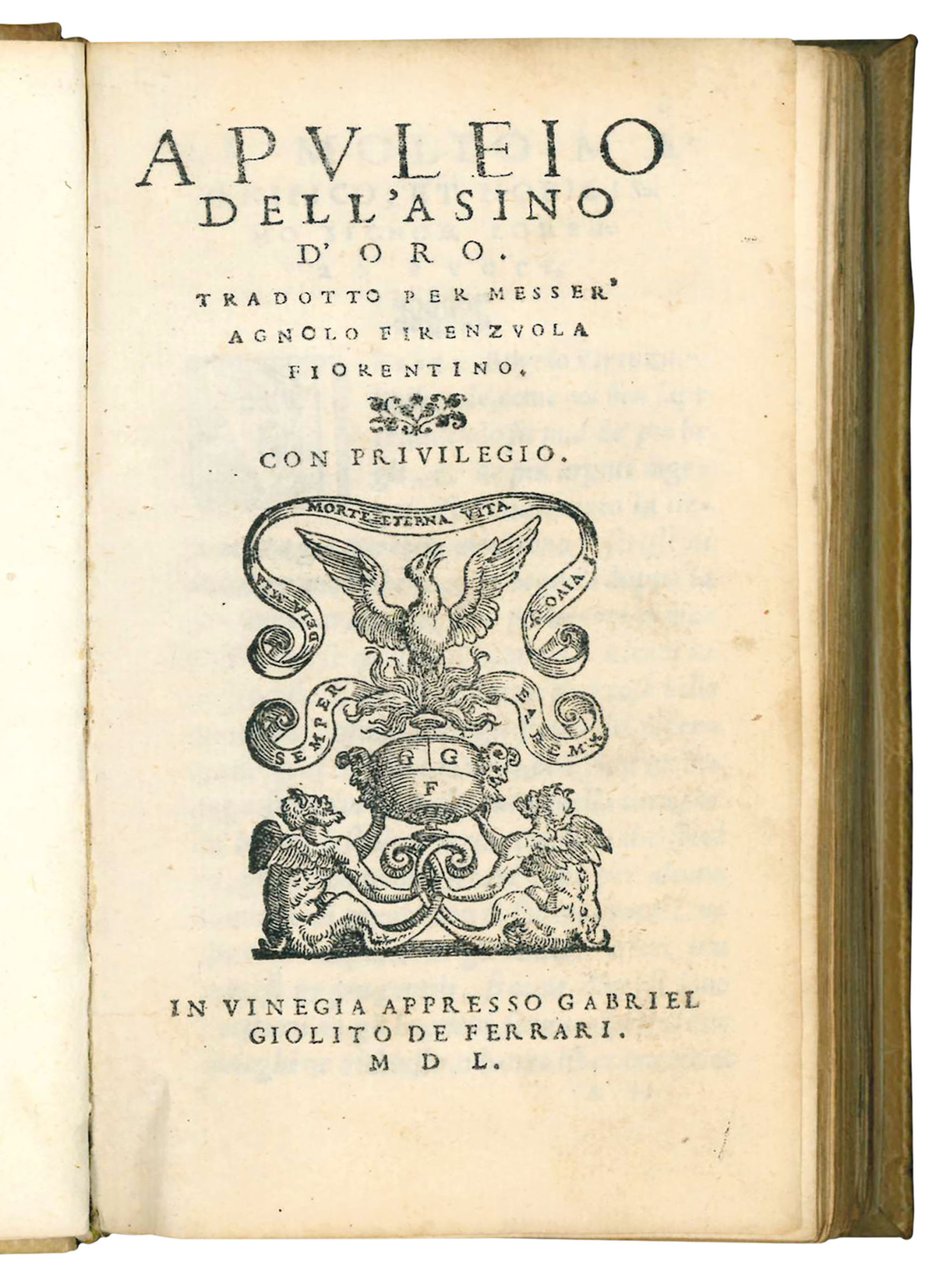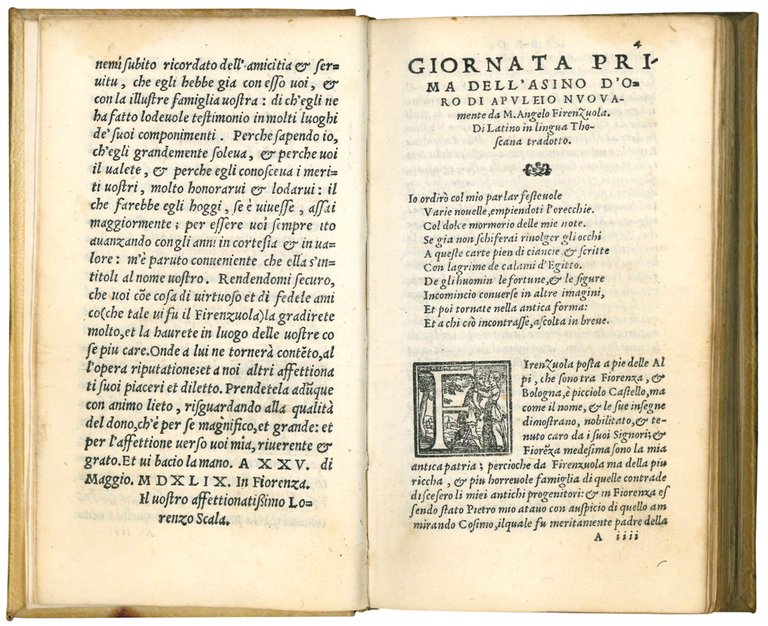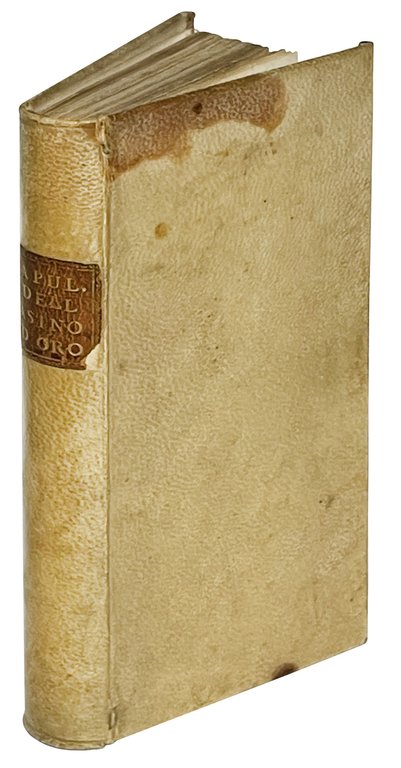


Livres anciens et modernes
APULEIUS (125-180)-FIRENZUOLA, Agnolo (1493 ca.-1545)
Apuleio Dell'asino d'oro. Tradotto per Messer' Agnolo Firenzuola fiorentino
Gabriel Giolito de'' Ferrari, 1550
2500,00 €
Govi Libreria Antiquaria
(Modena, Italie)
Les frais d'expédition corrects sont calculés une fois que l'adresse de livraison a été indiquée lors de la création de la commande. Un ou plusieurs modes de livraison sont disponibles à la discrétion du vendeur : standard, express, economy, in store pick-up.
Conditions d'expédition de la Librairie:
Pour les articles dont le prix est supérieur à 300 euros, il est possible de demander un plan de paiement échelonné à Maremagnum. Le paiement peut être effectué avec Carta del Docente, Carta della cultura giovani e del merito, Public Administration.
Les délais de livraison sont estimés en fonction du temps d'expédition de la librairie et de la livraison par le transporteur. En cas de retenue douanière, des retards de livraison peuvent survenir. Les frais de douane éventuels sont à la charge du destinataire.
Pour plus d'informationsMode de Paiement
- PayPal
- Carte bancaire
- Virement bancaire
-
-
Découvrez comment utiliser
votre Carta del Docente -
Découvrez comment utiliser
votre Carta della cultura giovani e del merito
Détails
Description
First edition of the Italian adaptation by Agnolo Firenzuola of Apuleius' Golden Ass. Firenzuola's is overall the second Italian version of the work after that of Matteo Maria Boiardo (ca 1441-1494), which appeared at Venice in 1518 with the title Apulegio volgare.
All of Firenzuola's works, with the exception of the Discacciamento de le lettere inutilmente aggiunte ne la lingua toscana (‘Expulsion of the letters unnecessarily added to the Tuscan language') published at Rome in 1524, were edited posthumously by his brother Girolamo, who entrusted Lorenzo Scala and Lodovico Domenichi with the publication of Agnolo's papers: the Prose and the Rime appeared at Florence in 1548 and 1549; the comedies I Lucidi and Trinunzia at Florence in 1549; and the Asino d'oro, the only one not printed by Giunta in Florence, in 1550.
As stated by Scala in the dedication of the present edition to Lorenzo Pucci, dated from Florence, 25 May 1549, the manuscript of the translation that he found among Firenzuola's papers was deficient and was therefore completed by Domenichi in a style that perfectly imitated that of Firenzuola.
Agnolo Firenzuola, a native of Florence, followed in the footsteps of his father, a notary, and studied law in Siena and Perugia, where he met Claudio Tolomei and Pietro Aretino. After graduating, he took the holy habit in Vallombrosa and moved to Rome in 1518, where he became procurator of the Order at the Curia. In Rome he formed a literary circle with his friends from Siena and Arezzo, and made the acquaintance of P. Bembo, A. Caro and G. Della Casa. In 1526 he was dispensed from his vows and contracted syphilis, a disease that plagued him for a long time. The main reason for his decision to give up the habit was his meeting with a refined Roman noblewoman, the wife of a lawyer, whom Firenzuola praised in many of his works under the pseudonym of Costanza Amaretta. In 1538 he moved to Prato, where he founded the Accademia dell'Addiaccio and embraced again the monastic life, becoming abbot of the Monastery of San Salvatore. In the last years of his life, he was involved in a legal dispute with his sister over their father's inheritance and other quarrels (cf. F. Pignatti, Firenzuola, Agnolo, in: “Dizionario biografico degli Italiani”, Rome, 1997, vol. 48, s.v.).
Edit 16, CNCE2239; S. Bongi, Annali di Gabriele Giolito de' Ferrari, Rome, 1890, I, pp. 273-276; F. Federici, Degli scrittori latini e delle italiane versioni delle loro opere, Padua, 1860, pp. 141-142; F.L.A. Schweiger, Bibliographisches Lexicon der gesamten Literatur der Römer, Amsterdam, 1962, I, pp. 14-15.

